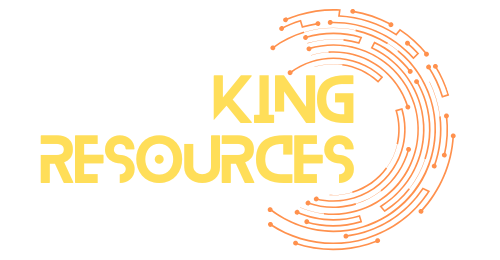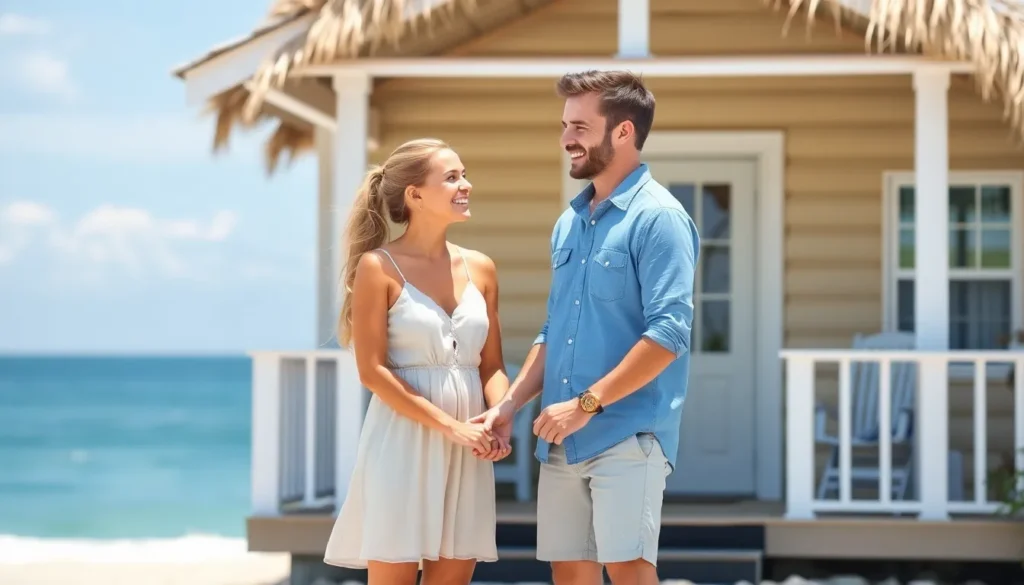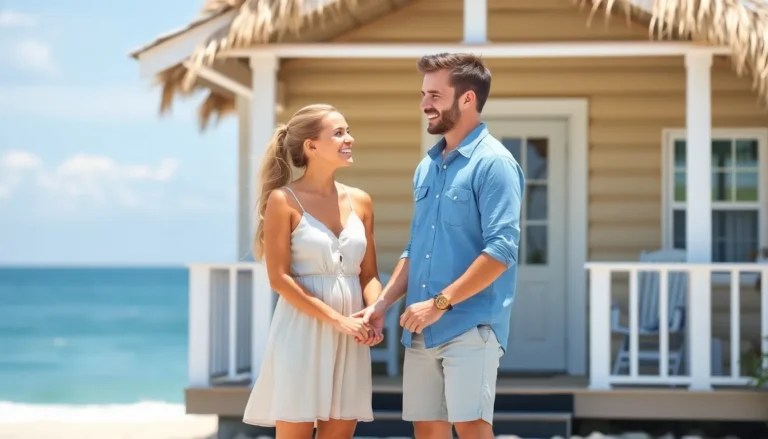Dreaming of a cozy getaway where you can sip coffee on the porch and listen to the waves crash? Vacation home loans might just be your ticket to paradise. These loans offer a chance to own a slice of heaven, whether it’s a beach bungalow or a mountain retreat. But hold on—before you rush off to pack your bags, it’s essential to understand how these loans work and what makes them different from your typical mortgage.
Table of Contents
ToggleUnderstanding Vacation Home Loans
Individuals interested in purchasing a second home often turn to vacation home loans. These loans provide specialized financing for properties intended for seasonal or occasional use.
What Are Vacation Home Loans?
Vacation home loans cater to buyers looking for properties that aren’t primary residences. These homes can be used for personal enjoyment or rented out to generate income. Lenders typically require a higher credit score for these loans compared to standard mortgage loans, reflecting the perceived risk. Financing options may include fixed or adjustable-rate mortgages. Interest rates often vary based on market conditions and lender policies.
Key Features of Vacation Home Loans
Several important characteristics define vacation home loans. Minimum down payment requirements usually range from 10 to 20 percent, depending on the lender. Borrowers should note that these loans allow for tax-deductible interest if the home meets IRS requirements. Debt-to-income ratios often play a crucial role in qualifying. Monthly payments encompass principal, interest, property taxes, and homeowners insurance. Lastly, many lenders allow prepayment, enabling borrowers to pay off loans early without penalties.
Types of Vacation Home Loans

Various types of vacation home loans exist to cater to different buyer needs. Understanding these options enables informed financial decisions.
Conventional Loans
Conventional loans serve as a popular choice for vacation home financing. These loans typically require a minimum down payment of 10 to 20 percent. Many lenders necessitate a credit score of at least 620, reflecting the borrower’s creditworthiness. Fixed-rate mortgages offer stability with consistent monthly payments, while adjustable-rate mortgages can provide lower initial rates. Interest rates may vary based on market conditions, impacting overall affordability. Additional costs include property taxes and homeowners insurance, which should be considered when budgeting.
FHA and VA Loans
FHA and VA loans present alternative financing options for vacation homes. FHA loans cater to buyers with lower credit scores, requiring a minimum down payment of 3.5 percent. These loans allow for greater flexibility but typically only apply to primary residences. VA loans, available to eligible veterans and active-duty military members, offer significant benefits, including no down payment and competitive interest rates. Both loan types have specific guidelines and requirements, making it crucial to verify eligibility before proceeding.
Benefits of Vacation Home Loans
Vacation home loans offer unique advantages tailored for acquiring a second home. These benefits cater to both investment opportunities and personal use.
Investment Potential
Investment potential stands out as a significant benefit. Buying a vacation home can generate rental income, particularly in popular tourist destinations. Many homeowners rent their properties during peak seasons, achieving substantial profits. This rental income often covers mortgage payments and property expenses. Appreciation in property value can also occur, providing long-term financial gains. Analyzing local market trends assists buyers in selecting the right property, maximizing profitability. Ultimately, vacation homes serve as effective financial investments, balancing enjoyment and economic stability.
Personal Use Advantages
Personal use advantages enhance the appeal of vacation home loans. These loans enable buyers to secure a getaway tailored to their preferences. Having a dedicated space for family vacations provides comfort and familiarity. Such homes can become cherished gathering spots for friends and loved ones. Tax benefits further add incentive, allowing deductibility of mortgage interest if IRS conditions are met. Flexibility in usage permits stays whenever desired, enhancing quality of life. Ultimately, owners create lasting memories while enjoying a personalized retreat away from daily routines.
Choosing the Right Vacation Home Loan
Selecting the right vacation home loan involves considering several critical factors that tailor to individual financial situations.
Factors to Consider
Credit score significantly influences loan options. Most lenders expect a minimum score of 620, while FHA loans can accommodate lower scores. Down payment requirements also vary; conventional loans often necessitate 10 to 20 percent, whereas FHA loans may ask for as little as 3.5 percent. Interest rates fluctuate based on market conditions, impacting monthly payments. One must also evaluate the purpose of the vacation home. If planning to rent out, understanding rental income potential can enhance financial benefits. Lastly, debt-to-income ratios matter, serving as an essential metric for qualifying.
Tips for a Successful Application
Preparing for a successful application entails gathering essential documentation early. Compile proof of income, tax returns, and bank statements. Improve a credit score by paying down debts before applying. Shopping around for lenders can reveal competitive interest rates and diverse financing options. Consider getting pre-approved for a clearer understanding of budget limits. Clearly outline intentions for the home, whether for personal use or rental income, as this helps lenders gauge the risk. Lastly, maintaining a stable employment history instills confidence in lenders, improving the chances of approval.
Exploring vacation home loans opens up exciting possibilities for potential buyers. With the right knowledge and preparation, individuals can secure a second home that serves both as a personal retreat and an investment opportunity. Understanding the various loan options available allows buyers to choose the best fit for their financial situation and goals.
By considering factors such as credit scores and down payment requirements, they can navigate the application process with confidence. With careful planning and informed decisions, vacation home loans can lead to cherished memories and financial growth.









